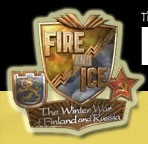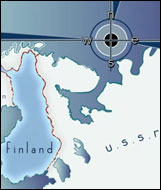

Finland, Germany, the Soviet Union and the United States
By January of 1943 the Soviets began to break the siege at Leningrad and defeated the Germans in the Battle of Stalingrad. The Finns saw both of these as signs that Germany would lose the war. Many of the Finnish commanders viewed the German defeat as a near certainty and this realization became a turning point in the Continuation War. In February, Mannerheim for the first time publicly stated that Finland would no longer pursue offensive actions in the war. In his remarks, he stated that he had lost enough soldiers in the fighting. These statements infuriated the Germans as they wish to have the Finns press on towards Murmansk. But Mannerheim is resolute in his decision. The Germans, who had at times been slow in sending arms to Finland, deliver the first batch of Messerschmitt Bf-109-G2 fighters to the Finns in March, but was it also in March that Finland was approached with an offer from the United States to act as an intermediary between Finland and the USSR. These U.S. efforts led nowhere as the Soviet terms offered to Finland are so harsh the United States did not pass them along to Finnish leadership.
Finland was apprehensive about making a separate peace with the Soviet Union as the Germans were still militarily strong and, as such, the Finns gave up the idea of peace talks for the time being. German Foreign Minister Ribbentrop became irate when he was informed that the United States had approached Finland and that the Finns seemed willing to listen to offers of leaving the war. Hitler demanded a treaty be signed between Finland and Germany stating their common goals in the war against the USSR, but the Finns refuse to sign such a treaty. By the first of June 1943, the Finnish members of the SS were released from their contract of service to the Germans and return to Finland. This further angered the Germans, but there was nothing they could do to prevent this from taking place. In this time frame the Finns were very worried what German reaction might be. They saw what took place in Italy in September when the Italians tried to break from German control and leave the war. The Germans were also cutting back aid to Finland which added to Finnish concerns.
By September 1943 Hitler was convinced Finland would leave the war. As a measure against this he set a plan in place where if the Finns did leave the war, German forces would seize Åland and Suursaari from the Finns. The next month German Gen. Jodl threatens the Finns with serious German action if the Finns leave the war. Tensions between Finland and Germany were getting much more animated and heated as the Finns felt leaving the war is the wise choice. Finland had never been an ally of Germany in the war. They felt they were co-belligerents with the Germans against a common enemy. As such, making a peace with the Soviet Union separate from Germany would be correct as the Finns were, in their minds, fighting a separate war from the Germans.
In November the British declared that Finland was an Axis Nation and should only be allowed to accept non-conditional terms of surrender. The Soviets reversed this statement a few days later, allowing the Finns to surrender with negotiated peace terms. The Finns proposed an agreement that would have reinstated the old 1939 borders, but the Soviets reject this idea. The idea for peace was still alive, but no one seemed to be able to find an agreement that is acceptable to all sides. The Finns were dealing more and more with Soviet “partisan” troops behind Finnish lines on all fronts and these actions were becoming more and more of a problem to the Finns. It is also clear to the Finns that the Soviets were rearming their forces which made them more dangerous. Finland was also suffering as the Germans were not supplying arms in the manner promised. In December, Stalin began planning for large scale bombing raids on Finnish targets. Most of these bombings began in February 1944, with Helsinki suffering much of the focus of the attacks. By the end of 1943, 38,144 Finn soldiers had been killed or wounded.





